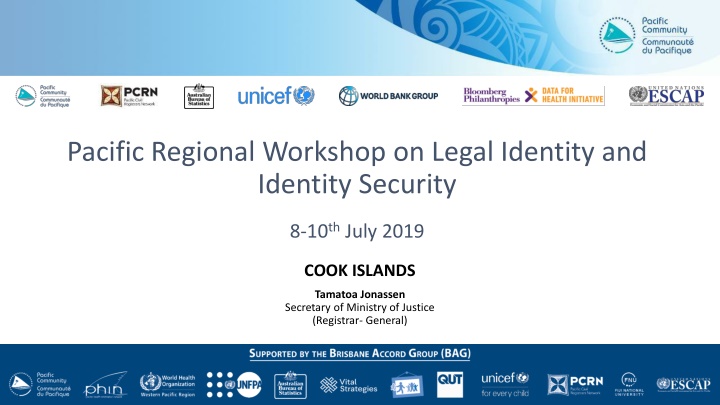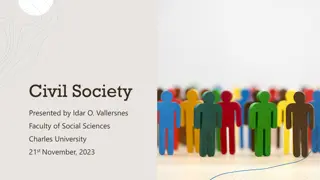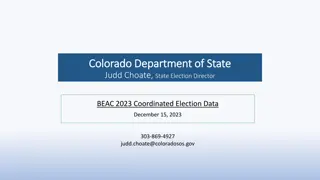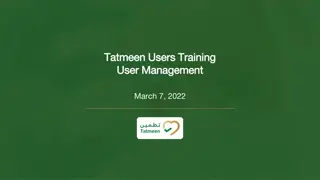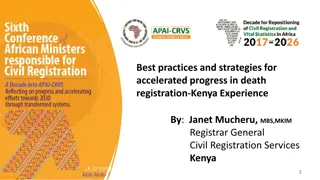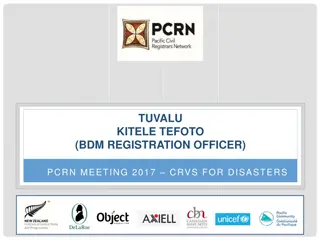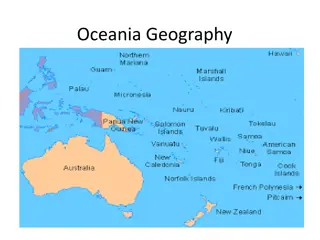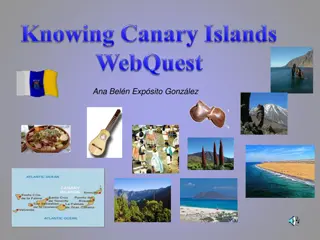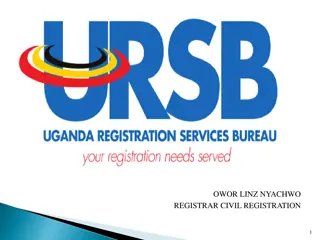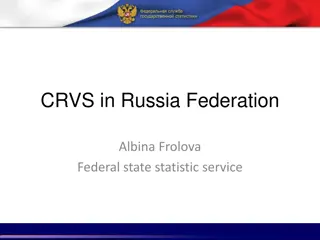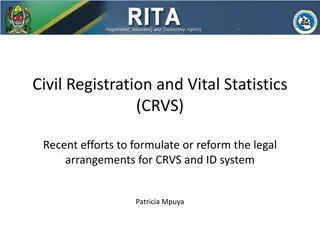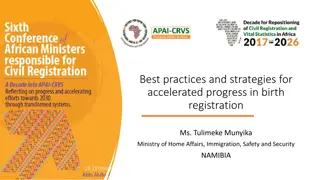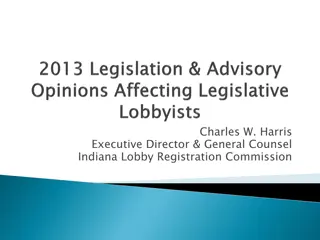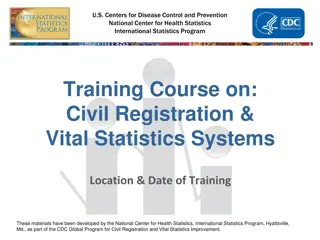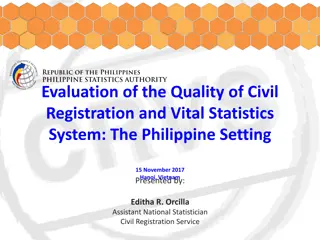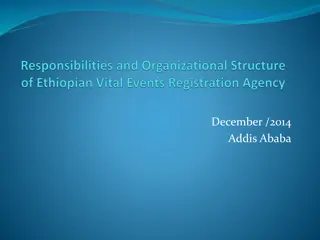Cook Islands Civil Registration and Identity Data Overview
Dive into the Cook Islands' civil registration system, population data, and identity documentation processes. Gain insights into birth registration completeness, resident demographics, national ID system plans, and more. Explore the role of the health sector and ICT in maintaining legal identity records. Discover the significance of birth and death certificates in the context of land ownership and succession. Uncover the challenges and progress in ensuring accurate identity validation through civil registration data.
Uploaded on Mar 06, 2025 | 0 Views
Download Presentation

Please find below an Image/Link to download the presentation.
The content on the website is provided AS IS for your information and personal use only. It may not be sold, licensed, or shared on other websites without obtaining consent from the author.If you encounter any issues during the download, it is possible that the publisher has removed the file from their server.
You are allowed to download the files provided on this website for personal or commercial use, subject to the condition that they are used lawfully. All files are the property of their respective owners.
The content on the website is provided AS IS for your information and personal use only. It may not be sold, licensed, or shared on other websites without obtaining consent from the author.
E N D
Presentation Transcript
Pacific Regional Workshop on Legal Identity and Identity Security 8-10thJuly 2019 COOK ISLANDS Tamatoa Jonassen Secretary of Ministry of Justice (Registrar- General)
Presentation Outline Presentation Outline 1. Brief Background: Cook Islands Context 2. Status of the civil registration system 3. Role of the health sector in supporting civil registration 4. Role of ICT in record capture, storage and archival 5. Use of civil registration data to confirm/ validate legal identity 6. Plans for establishment of national ID system
Brief Background: Cook Islands Context Brief Background: Cook Islands Context
Brief Background: Cook Islands Context Brief Background: Cook Islands Context 2016 Census Resident Population Population on Rarotonga Residents born outside Cook Is. Population < 15 yrs and > 59 yrs. 14,082 75% 29% 42% 2013 NZ Census Cook Islanders in NZ* Cook Islanders in NZ who are born in NZ** * 20.9% of "Pacific peoples population" in NZ. ** 181,791 people identified with at least one Pacific ethnicity. 61,839 77.4% 2016 Australia Census Cook Islanders in Australia Growth from 2006 22,228 95.0%
Brief Background: Cook Islands Context Brief Background: Cook Islands Context Land Ownership System encourages births/deaths registration. Land succession require birth/death certificates. Birth in the Cook Islands: New Born Allowance (NZD $1,000): Born in Cook Is. to national(s) or PR(s). Child Benefit ($100/month). Passports required for travel outside Cook Islands (require birth certificate). No Cook Islands Passport.
Overview: Status of the civil registration Overview: Status of the civil registration system: system: Note: Census does not capture births/deaths. Estimated birth registration completeness for the most recent years (Actual Registration/Estimate Live Births)*100 = 2016: (252/242)*100 = 104% 2017: (230/222)*100 = 104% 2018: (254/232)*100 = 109% 2016: Resident Population: 14,082 Total Population: 17,434 Year 2016 Total Arrivals 159,219 Total Departures 158,931 Visitor Arrivals 146,473 Visitor Departures 145,014 Resident Arrivals 12,746 Resident Departures 13,917
Overview: Status of the civil registration Overview: Status of the civil registration system: system: Note: Census does not capture births/deaths. Estimated death registration completeness for the most recent year (Actual Registration/Estimate Deaths)*100 = 2016: (105/87)*100 = 121% 2017: (104/93)*100 = 118% 2018: (147/121)*100 = 121%
Role of the health sector in supporting civil Role of the health sector in supporting civil registration functions registration functions Does the Ministry/department of health support civil registration functions in your country? If so, please share your experience on how. Ministry of Health sends Notice of Birth/Death to Ministry of Justice. Most births occur at the Rarotonga hospital. Births outside a hospital are brought to the hospital for medick checks soon after birth. Medical practitioners certify all natural deaths and coroners (administration of the Coroners Act 1979-80 is supported by the Ministry of Justice) report on unnatural deaths. Funeral directors on behalf of the family can facilitate registration and processing of death certificates.
R Record capture, storage and Archival ecord capture, storage and Archival Does your country operate a manual or electronic system of data capture and storage for civil registration functions? Both (manual system, augmented by electronic database) If electronic: Provide name of IT system in use: Microsoft Access Are individual birth records linked to death records? (i.e. is the system person-based or event based?) No (event based) Do you use a unique identification number/code for civil registration records If yes, how is it generated, what is the structure of the number/code? Births/Deaths = 4 letters (island) + 4 digit year + 4 digit sequence. Is the code used by other government departments, if yes, which ones? Not used.
Use of civil registration data to confirm/ validate Use of civil registration data to confirm/ validate legal identity legal identity Do you share birth and death data collected through civil registration to other government departments ? Yes If so which government departments do you most regularly share data with? Ministry of Internal Affairs (child benefit & pension purposes) RMD Tax authority (tax purposes) Ministry of Finance and Economic Management Statistics Office Ministry of Foreign Affairs and Immigration Is the data shared electronically or manually ? By Email Is data sharing regulated by legislation or any policy instrument? No explicit datasharing legislation. Memorandums of Understanding (MOUs). Official Information Act 2008 Please share any challenges/ relevant experiences surrounding the sharing of such data Would be easier if central database with unique ID number. Example: Same person came to court under two different names (both charges came from Police)
Status and plans for implementation of a Status and plans for implementation of a national ID system national ID system Please share your country s status and plans for implementation of a national ID system Does your country have or are there plans for implementation of a national ID system? No published plans. There are discussions at high government level. Which Ministry is leading its implementation? ICT has central role. Is the national ID system linked to the civil registration system (do birth and death records from civil registration flow into the national ID system)? N/A Please share any relevant experiences/challenges associated with this theme Example: Succession to land based on name (not unique ID) in genealogy tree where ancestor has aliases. Challenge: Seen as Big Brother if link databases.
Recent developments and/or plans Recent developments and/or plans Please share any of your recent developments or short-term plans towards the development of your CRVS systems Beginning stages of: Exploring scope of National ID system. Exploring IT solutions to facilitate online birth/death/marriage certificates.
